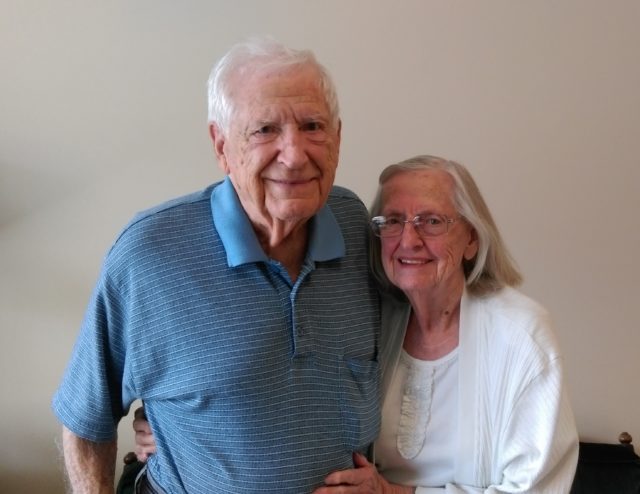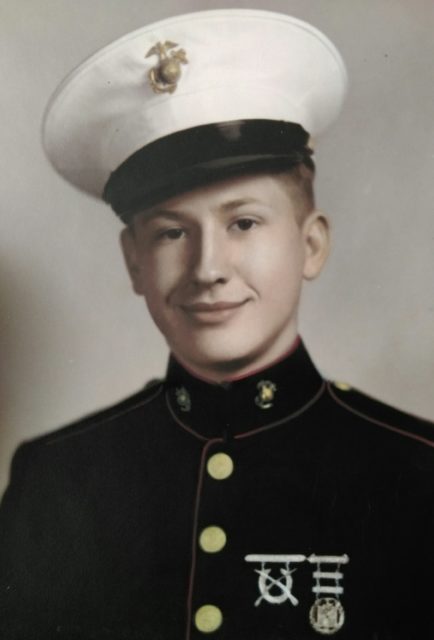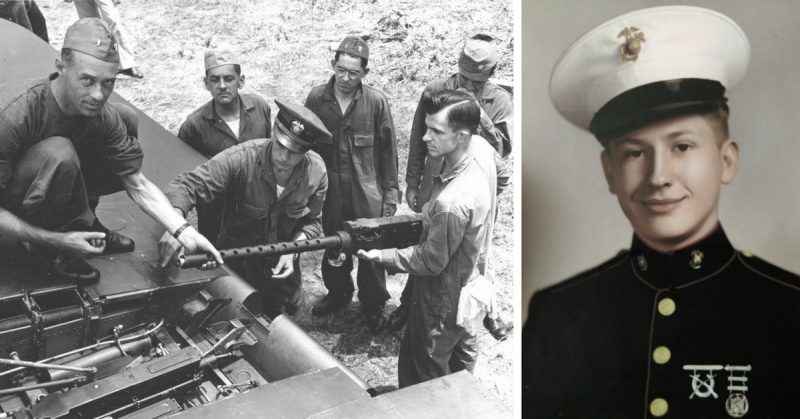War History online proudly presents this Guest Piece from Jeremy P. Ämick, who is a military historian and writes on behalf of the Silver Star Families of America.
While glancing at his wife of nearly seven decades, Earl Tisdale mirthfully explained, “I wouldn’t trade her for all the tea in China.” He went on to discuss his service in World War II, at which point the fondness shared by the couple becomes evident, having survived the separation of military service and growing ever stronger throughout the years.
Raised in north St. Louis, Tisdale graduated from Ferguson High School in 1943. His father, who was acquainted with a local draft board member, was then informed that his son’s draft number would soon be selected.
“That’s when I decided to join the Marines because it has always fascinated me and I figured it would allow me to have at least some control over my military career,” said Tisdale.
The 17-year-old enlistee traveled to San Diego in early August 1943 where he “went through the routine” while completing his basic training. From there, he was assigned briefly to a Marine Air Squadron at Miramar, Calif., before traveling to Norman, Okla., for several weeks of aviation “Ordnancemen’s School” at the Navy Technical Training Center.
“We learned how to handle all different kinds of ammunition used on airplanes, including bombs,” Tisdale explained. “We learned how to fuse and defuse them … and that was no fun.”
The next destination in his military career was with the 3rd Marine Aircraft Wing at Cherry Point, N.C., in the spring of 1944, where he spent several months applying the training that he had received while in Oklahoma.

“I stayed at Cherry Point until September 1944, and that’s when they sent us overseas aboard a freighter,” he said. “Our first stop was at Majuro (Atoll) in the Marshall Islands and I stayed there for a few months loading ammunition on planes coming in off the aircraft carriers,” he added.
On the island, Tisdale recalled, a storm brought with it strong winds that destroyed their food supply. Though a supply ship was dispatched to replace the lost provisions, during the several days that it took for it to arrive, the Marines were forced to rely upon a single, plentiful food source.
“Some of the guys climbed the trees and collected coconuts that we were able to eat until the ship came in to bring us food,” he said. “I got so tired of eating coconuts and to this day cannot stand to eat one,” he grinned.
The young Marine went on to spend several weeks working at an airfield on Kwajalein Island. He was then sent to Guam and detailed to guard Japanese prisoners.
“The Japanese were still up in the hills and occasionally came down into our camp, hiding and killing some our GIs,” he somberly recalled. “Some of them were able to get our boys before we were able to get them … it was a terrible situation.”
While stationed on Guam, Tisdale and his fellow Marines learned of the end of the war with Japan following the use of the atomic bombs on Nagasaki and Hiroshima. Within a few weeks’ time, he was sent back to the United States and received his discharge at the Naval Air Station in Glenview, Ill., in August 1946, having achieved the rank of staff sergeant.
Following his discharge, Tisdale’s life focused on two important factors: building a career and continuing his relationship with Ann, the girlfriend from whom he had been separated for three years because of his World War II service.

“We decided not to marry before the war,” he said, “just in case something were to happen to me while I was in the service.”
On November 21, 1947, he and Ann were married and a young Tisdale began to provide for his family by selling paint for a company in the St. Louis area. In an effort to establish a more stable income source, he soon enrolled at Washington University and completed an aeronautics course.
He was later employed with McDonnell Douglas and spent 35 years with the company coordinating the delivery of completed aviation components for aircraft such as the F-4 Phantom and F-15 Eagle. Following his retirement in 1982, the father of two daughters remained in Ballwin and began working part-time in the funeral business, from which he eventually retired at 86 years old.
In 2011, Tisdale and his wife relocated to Jefferson City, Mo., as the advent of age necessitated they reside closer to their children.
In discussing his service during World War II, Tisdale explained that although he believes that the service he performed in the military was not nearly as significant as that of other young Americans, it was a responsibility that needed to be fulfilled.
“I think that because the Japanese attacked our country, it was our duty as Americans to protect it; I think that’s the way most people felt back then. I don’t feel like I was in danger like some of the boys that invaded certain areas and such, but I did what I was asked to do.”
With a brief pause, he noted, “I can remember being overseas and waiting for letters from Ann. We didn’t seem to get letters all that often … they just didn’t seem to get to us.”
His wife softly added, “Naturally I was worried about his safety during the war. At that time, all of my friends were in the service and you just worried about them all and prayed they made it home safely.”
